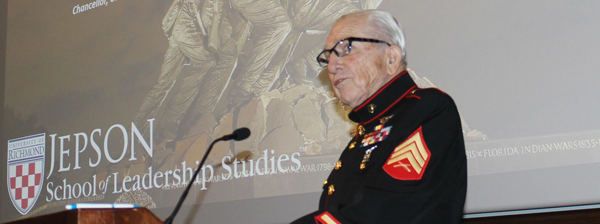
In an address to a packed crowd, Dr. E. Bruce Heilman delivered a speech, brilliantly entitled “Why They Never Talked about It.” Chancellor Heilman, who was president of the University of Richmond from 1971-1986 and interim president from 1987-1988, leads the University by example, traveling 100,000 miles on his ecologically sound Harley-Davidson motorcycle in the last decade.
These travels are much more than a hobby for Dr. Heilman: he uses the occasion to visit with alumni. He also visits World War II veterans in his role as the national spokesperson for The Greatest Generations Foundation, a nonprofit dedicated to honoring the sacrifices of veterans. A World War II veteran himself, he is quick to point out that World War II veterans are presently few in number.
Dr. Heilman’s remarks are a powerful testimony to the importance of leading by example. Dressed in his Marine Blues, he spoke about how it was nearly impossible for the returning soldiers to share the horrors of their experience with those who did not suffer. In recent years, however, Dr. Heilman is performing an extraordinary service for them. He speaks for them, even using their own words, so that those of us who have waited might at least come close to appreciating what they endured.
Dr. Heilman remarked on two important misconceptions about war. First, we tend to think the sounds of war are the sounds of bombs bursting or machines operating. This may stem in part from portrayals of wars in movies. Certainly, the soundtracks ignore what Heilman claimed are the real sounds of war: those associated with human suffering and affliction. Second, we tend not to think about the smells of war, and if we do, we are likely to think of gunpowder or explosive chemicals. Again, he brought us the reality of war, the stench of human suffering.
He also spoke about the questions, and guilt, that so many survivors carry: Why was the foxhole that sheltered a survivor unscathed while those around it were destroyed?
These are not easy subjects, but someone has to tell the stories, if only so we can appropriately recognize those who suffered. Even more so that we can understand, and perhaps avoid, the terrible destruction associated with war.
“Those who believe that life without freedom is intolerable, remember that the willingness to accept the risks of the ultimate sacrifice is the price of that freedom,” Dr. Heilman said in the Jepson School of Leadership Studies presentation. The presentation is available on our website and podcast, accessible wherever you stream your favorite podcasts.
